The digital age has revolutionized the world, notably propelling B2B ecommerce to the forefront of the commercial scene!
Marketplaces such as Amazon Business, Alibaba, and Rakuten are a perfect testament to this evolution. Their growth reflects a growing trend: professional consumers’ increasing preference for online solutions for making purchases.
Providing seamless, multi-platform buying experiences, B2B marketplaces can serve as a key sales channel within a broader omnichannel ecommerce strategy.
What is a B2B marketplace?
B2B stands for “business to business”: sellers are professionals who sell to professional customers like themselves.
A B2B marketplace is an online platform that enables companies to buy and sell products and services from and to each other. Unlike B2C ecommerce platforms and marketplaces, which target individual consumers, B2B marketplaces are designed to meet the specific needs of businesses.
They therefore offer additional features, such as bulk ordering, customized invoicing, and payment options tailored to business transactions.
In addition, they facilitate international business interactions. Finally, B2B marketplaces also provide access to a wide range of potential suppliers and customers.
How do you make money on a marketplace?
To make money on a marketplace, companies generally set their prices taking into account the platform’s fees and their operational costs.
Of course, most marketplaces charge a commission on sales, which can vary according to volume. Some marketplaces also offer premium subscriptions with reduced fees in exchange for a monthly or annual membership.
To maximize their revenue, businesses need to set the right price for their items, so as to generate sufficient margin while remaining competitive. In reality, the mechanism is much the same as on a B2C marketplace.
Who manages sales on a marketplace solution?
On marketplaces, sales are generally orchestrated by the merchants themselves. They’re responsible for product placement, pricing, inventory management, and customer service.
The marketplace, for its part, provides the infrastructure, i.e., the sales platform, integrated payment systems, and sometimes even additional logistics services. Some marketplaces also offer advertising and marketing services, as well as the possibility of analyzing sales data.
Advantages of using B2B marketplaces to sell online
Wider reach and new customers
B2B marketplaces connect sellers with a large network of buyers around them worldwide, helping them reach new markets without investing heavily in marketing or infrastructure. This exposure attracts new customers who may not have discovered the seller otherwise.
It’s especially beneficial when selling online, as it reduces marketing costs and speeds up growth. With built-in trust, search features, and streamlined transactions, you can scale more easily and tap into new markets with less effort!
Lower customer acquisition costs
Since these platforms already provide a ready-made audience of buyers actively searching for products, sellers save on advertising, lead generation, and sales outreach costs. As B2B companies spend $536 on average to acquire a new customer, according to BusinessDasher, saving money in this area is advantageous for your budget, especially if you have a newer business.
B2B marketplaces can reduce upfront costs, improve ROI, and allow your business to focus more on fulfilling orders and growing efficiently, rather than spending time and money finding buyers.
Streamlined sales process
You’ll also find that using a B2B marketplace allows you avail of integrated tools for product listings, order management, payments, and communication—all in one platform. This simplifies operations, reduces manual work, and speeds up transactions.
For online sellers, this is a key benefit because it enhances efficiency, minimizes errors, and improves the overall buyer experience. With automation and centralized management, businesses can handle more orders with less effort, allowing them to scale faster and focus on growth.
Trust and credibility
Established marketplaces usually offer buyer protection, reviews, verification features, and secure payment and dispute resolution systems. which help build trust with potential customers faster. Buyers feel more confident purchasing from a trusted platform with verified suppliers and transparent ratings.
Increased trust aids in reducing buyer hesitation and increases conversion rates. Sellers benefit from the marketplace’s established reputation, making it easier to attract and retain customers, especially in competitive or unfamiliar markets.
Data and analytics
Many platforms provide valuable data and analytics, such as customer behavior, sales trends, and product performance. This helps sellers make informed decisions about pricing, inventory, and marketing strategies.
When selling online, having access to these insights is a major plus—it allows businesses to optimize operations, target the right buyers, and improve sales performance. By leveraging data, you can stay competitive, respond quickly to market changes, and grow more effectively in the digital space.
Disadvantages of using B2B marketplaces to sell online
High competition and price pressure
When using a B2B marketplace to sell on the internet, you’ll often be listed alongside many sellers offering similar products. This intense competition can drive prices down, leading to thinner profit margins.
Buyers may focus heavily on price, making it harder to compete without sacrificing profitability. This can then reduce earnings and make it challenging for your business to stand out from the crowd.
Fees and commissions
Most marketplaces charge listing fees, transaction fees, or take a commission on each sale — which can eat into your profits over time. While these platforms provide valuable exposure, the added expenses can be significant, especially for smaller businesses or low-margin products.
This is a disadvantage when selling online because it reduces overall profitability and may limit a seller’s ability to offer competitive pricing or invest in other areas like marketing or product development.
Less control over branding and customer relationships
B2B marketplaces tend to prioritize their own brand and customer experience, limiting your ability to personalize interactions, build brand loyalty, or market directly to buyers. As a seller, you may have little control over the buying experience, customer data, or how your products are displayed.
This can weaken brand recognition and make it harder to build loyal customer relationships. Without direct engagement, it’s challenging to differentiate, provide personalized service, or market to customers outside the platform.
List of today’s 11 best B2B marketplaces
1. Amazon Business
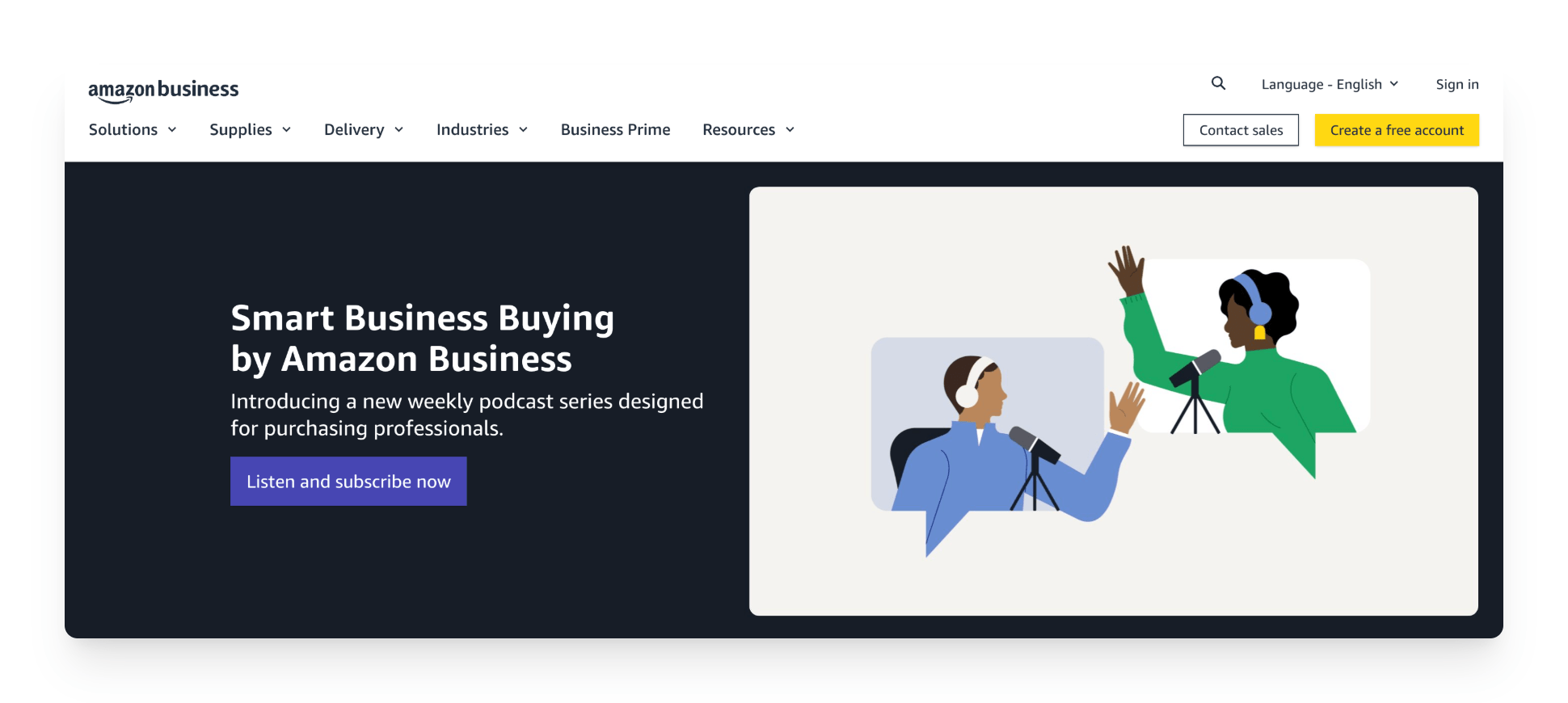
Amazon Business is an extension of the renowned Amazon marketplace, designed specifically for the needs of businesses. This pro version also offers a wide range of products.
It also integrates other features, such as exclusive prices for professionals, bulk purchasing and flexible payment options.
In other words, Amazon Business makes B2B purchasing easy, with an intuitive user interface and ultra-efficient customer service!
2. Alibaba
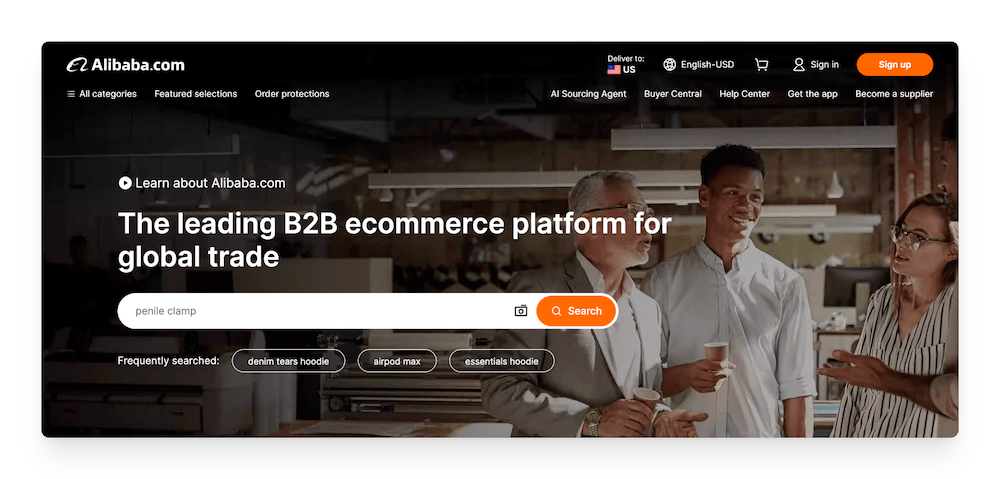
If you’re looking for high-volume products at rock-bottom prices, welcome to Alibaba, the online wonderland!
Alibaba is an ecommerce platform from China that focuses on wholesale purchasing. It connects suppliers, mainly in Asia, with professional buyers from all over the world.
The creation of direct links between companies considerably simplifies the procurement process, enabling small and medium-sized enterprises (SMEs) to benefit from rates normally reserved for large professional buyers.
Alibaba is truly the solution of choice for uncovering unparalleled business opportunities and confirms its status as the undisputed leader in the online wholesale market.
3. Made-in-China
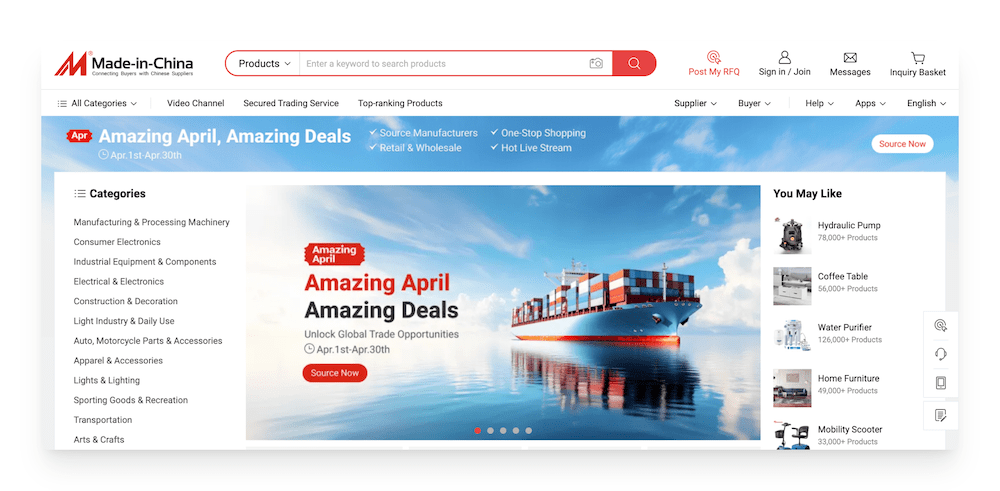
Made-in-China is a leading B2B marketplace that connects global buyers with Chinese suppliers and manufacturers. It offers a wide range of products across industries like electronics, machinery, textiles, and consumer goods.
The platform provides detailed supplier profiles, product catalogs, and tools for secure communication, quotes, and transactions. Made-in-China is known for its strong supplier verification process and multilingual support, making international trade more reliable and accessible.
Its extensive product range, competitive pricing, and focus on quality control have made it one of the top B2B marketplaces for businesses looking to source directly from China efficiently and with confidence.
4. Scoutstock
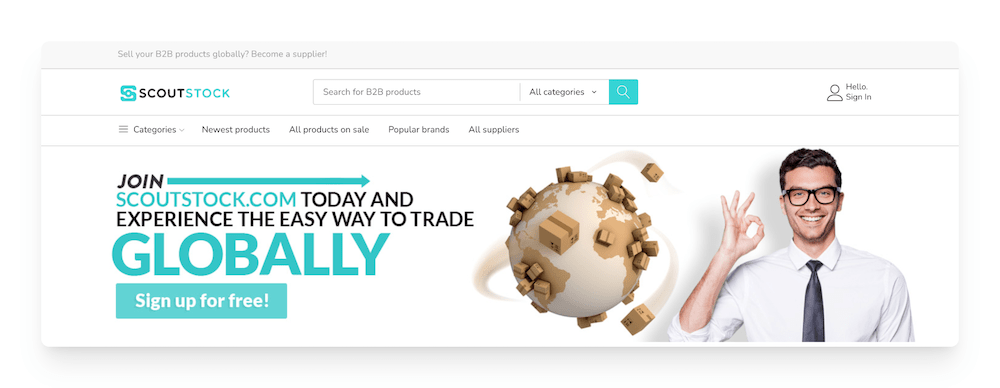
Scoutstock stands out as a B2B marketplace specializing in industrial components and technical equipment. More concretely, this means that it’s designed exclusively for professionals looking for parts dedicated to very specific uses, notably for industrial machinery and tools.
Scoutstock’s strength lies in its easy purchasing system, thanks to an intuitive interface and advanced search options. Scoutstock is nevertheless a B2B marketplace a little different from those mentioned above, especially known to companies in the manufacturing, engineering, and maintenance sectors, to enable them to source specialized industrial equipment.
5. TradeWheel
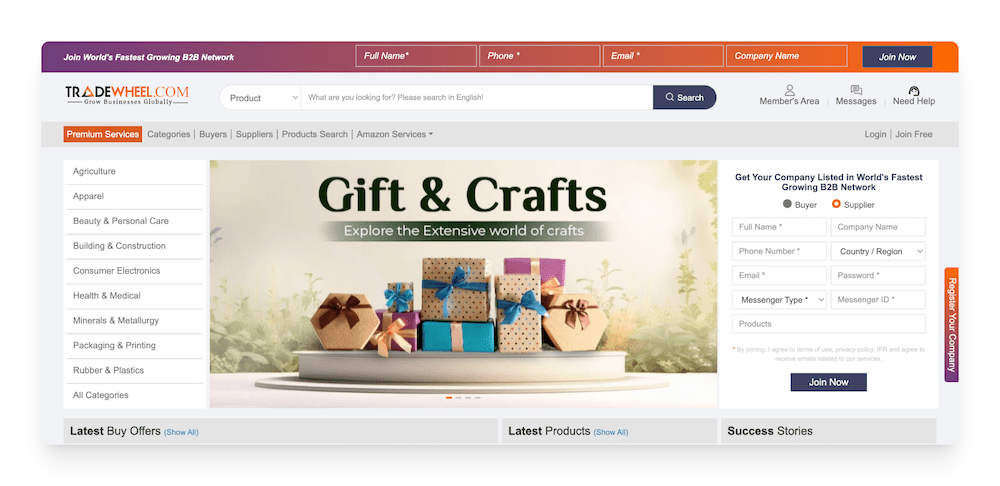
TradeWheel is a more global marketplace, serving as a bridge between international suppliers and B2B buyers. This generalist site offers a wide range of products, covering diverse sectors such as apparel goods, electronics, even agriculture and chemicals, etc.
TradeWheel is the benchmark marketplace for B2B buyers looking to source all types of very specific products, with uses dedicated to only certain business categories, a far cry from generalist marketplaces.
In this sense, as the platform deals with very specific themes, it has equipped itself with tools to enable wholesalers and buyers from all over the world to conduct their business in the best way possible, to help companies find the right trading partners and establish lasting business relationships.
6. DHgate
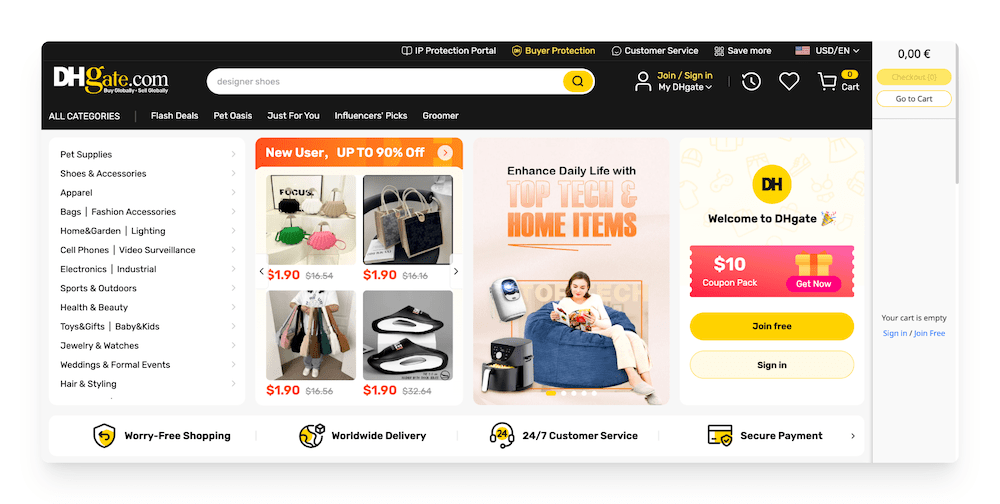
Like Alibaba, DHgate is a popular Chinese B2B and B2C marketplace. The site enables small and medium-sized businesses from all over the world to buy products directly from Chinese suppliers in large quantities. The model is quite similar to AliExpress in particular and operates on a worldwide scale.
With a vast range of merchandise, from home decor to beauty and connected products, DHgate is renowned for its ultra-competitive prices and wide variety of products. The platform also offers a secure shopping experience, with flexible payment options and a user experience that’s as well thought-out as a real shopping app.
7. Faire
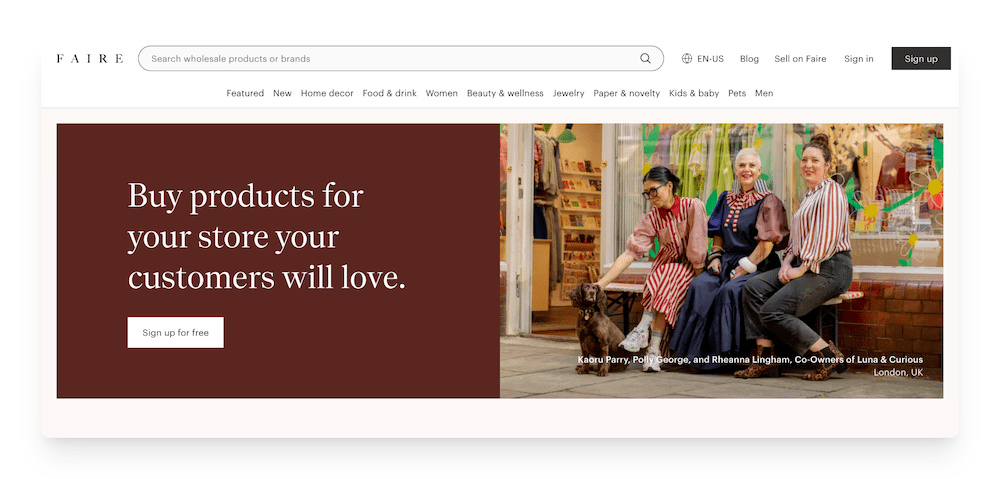
Faire is an innovative, trend-setting B2B marketplace that focuses exclusively on handcrafted and unique products. It connects independent manufacturers with retailers looking for original items. It’s a unique marketplace model, which has enabled Faire to establish itself among B2B players over the years.
What sets Faire apart is its commitment to small producers and local businesses. More than ever, this is a platform where creativity and originality are valued, undeniable assets for differentiating yourself in online sales!
By promoting sustainable, handmade products, Faire is an alternative to mass-produced goods, which will attract a public more concerned with authenticity and quality in specific sectors.
8. Global Sources
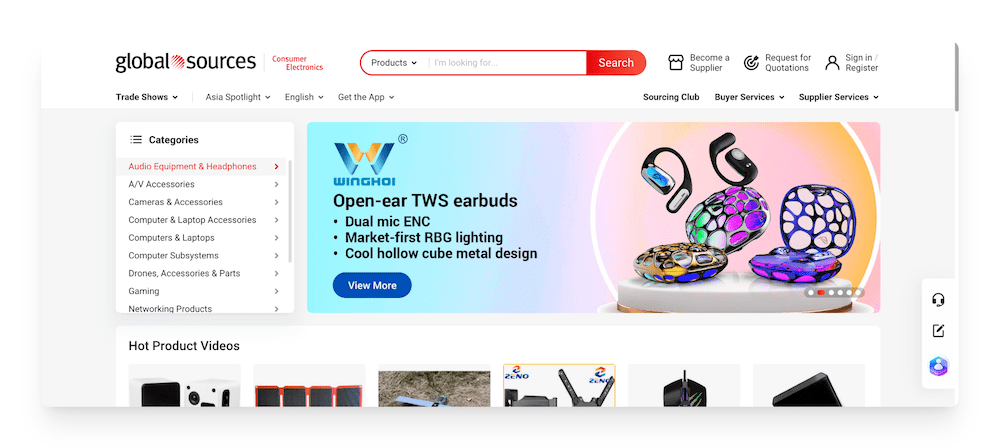
Global Sources is an international B2B marketplace, renowned for its specialization in import-export. It connects global suppliers with buyers from all over the world, via a broad spectrum of innovative, high-quality products.
Global Sources is particularly popular with companies looking for new products and trendy items. What’s more, it provides access to a large network of verified suppliers.
Users benefit from an efficient solution for browsing through a variety of product categories, enabling buyers to find precisely what they need.
Sellers, for their part, find Global Sources a privileged channel for reaching a global audience, enhancing their business and increasing their sales opportunities. This synergy between the platforms and their users creates a dynamic ecosystem, conducive to the development of lasting and fruitful business partnerships.
9. eWorldTrade
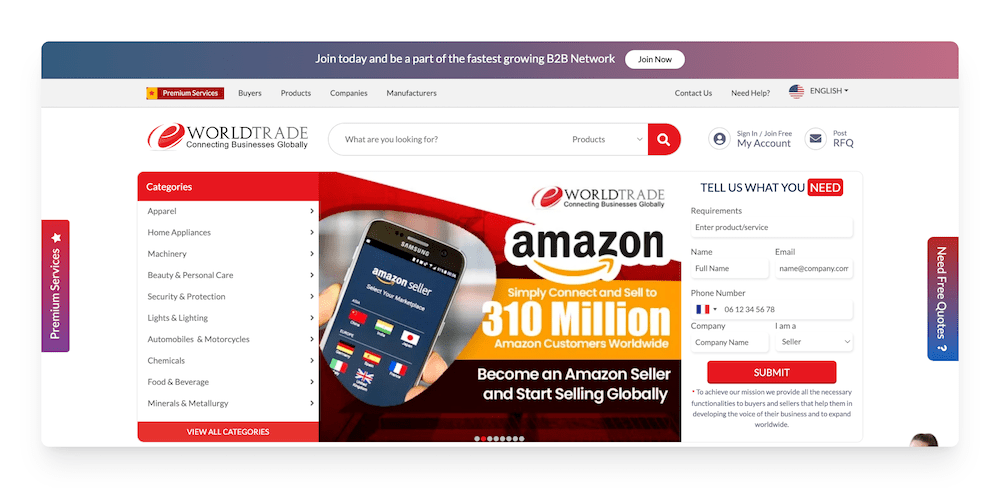
As its name suggests, eWorldTrade is an international marketplace. Its site offers exclusive access to products and services from a wide range of sectors. eWorldTrade’s added value: a user-friendly interface and a customer-centric approach, making it easy to connect buyers and sellers from all over the world!
It doesn’t just connect buyers and sellers: the platform plays an active role in the development and promotion of new creations and innovations. Thanks to its commitment to quality and excellence, it ensures that every product or service offered brings tangible benefits for both buyer and seller.
10. Europages
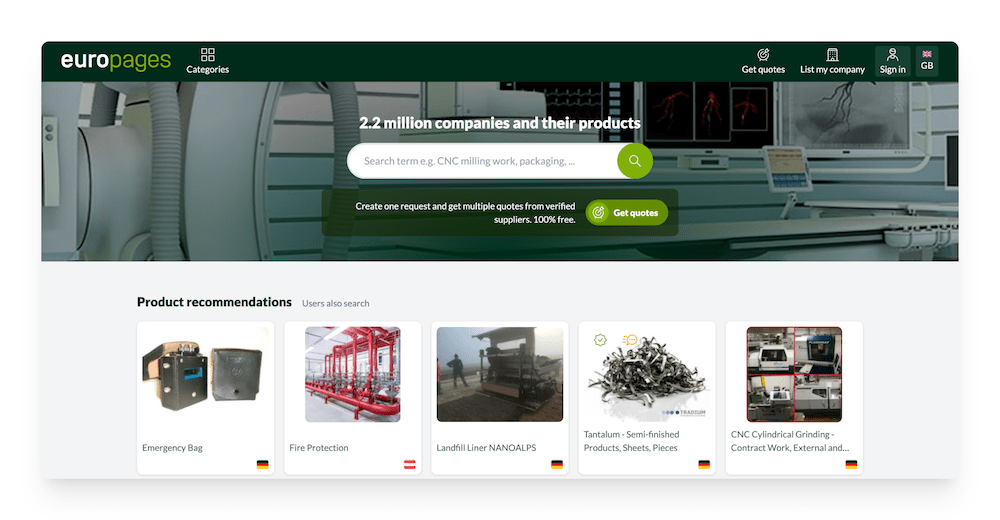
Europages is a B2B marketplace limited to the European market: it helps companies find suppliers and business partners exclusively in the European Union.
What makes Europages unique, however, is its extensive directory of companies in this geographical area. The platform is ideally designed to facilitate intra-European trade.
If you’re looking to expand your network and explore new business opportunities in the EU, with a focus on supplier quality and reliability, this is the site for you!
11. eBay Business & Industrial
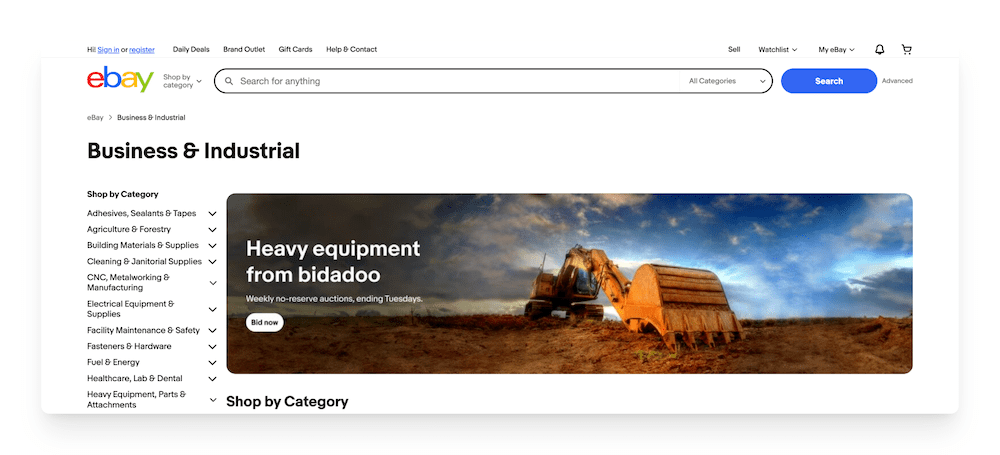
An extension of the well-known eBay platform, eBay Business & Industrial is specifically designed for the needs of businesses, offering a wide range of industrial and commercial products, from heavy goods to small office supplies.
This marketplace takes on the diversity of eBay, this time with a more professional orientation, to enable companies to easily find equipment essential to their business.
How do you create an online sales site and then sell on a marketplace?
To design an online store, you first need to choose a specialized platform to build the site itself. This is precisely where WiziShop comes in. With a subscription that includes over 400 features, unlimited AI, and real-time support from business coaches, WiziShop lets you build a unique, turnkey, tailored online business with all the necessary functions of electronic commerce!
Sign up and take advantage of a 7-day free trial today!
Try WiziShop free for 7 days
THE EASIEST NO-CODE ECOMMERCE SOLUTION✅ No credit card required
✅ Access to all features
✅ No commitment
The solution even takes care of managing flows for marketplaces from your sales site, whether you want to sell locally or internationally.
This is followed by the selection of products to be sold, payment systems, and the logistics process.
Finally, to sell on a marketplace, all that’s left to do is register on the chosen platform, create a seller profile, and list the products on offer. Please note: in this case, it’s very important to remember to synchronize your inventory and information between your company’s website and the marketplace, to ensure the consistency and efficiency of all sales operations.


![11 B2B marketplaces you need to know to sell your products [2026]](https://wizishop.com/media/67ed45f75baf0b4b56b1c563/v1/b2b-marketplace-wizishop.jpg)







